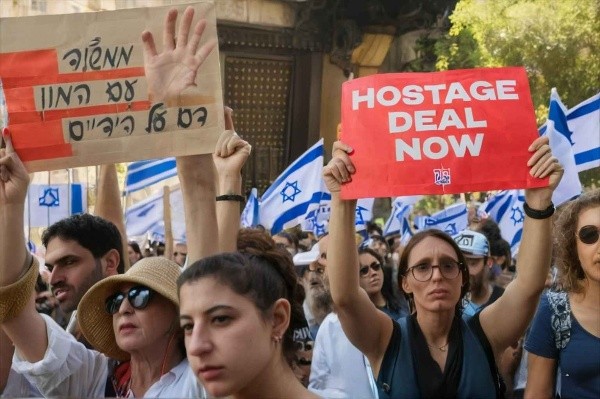Iran’s Plan to Strike Back Against the U.S.
Iran’s Military Preparations Following U.S. Attacks
Loading...

Group’s armed wing Qassam Brigades issues statement, two days after bodies of six captives are recovered from a Gaza tunnel by Israeli forces.
Hamas's Stark Warning
In a chilling statement, the armed wing of Hamas, the Qassam Brigades, has declared that captives held in Gaza will return to Israel "in coffins" if Israeli military operations persist. This warning comes just two days after Israeli forces recovered the bodies of six captives from a tunnel in southern Gaza, intensifying fears for the remaining hostages. Abu Obeida, the spokesperson for the Qassam Brigades, emphasized that the families of these captives face a grim choice: to receive their loved ones dead or alive. He accused Israeli Prime Minister Benjamin Netanyahu of prioritizing military pressure over negotiations, which he claims has led to the deaths of the captives.
Netanyahu's Response and Public Outcry
Following the recovery of the six bodies, Netanyahu stated that they had been "executed" by Hamas, expressing regret for not being able to bring them back alive. During a televised address, he acknowledged the ongoing protests in Israel, where demonstrators have criticized his government for failing to secure a ceasefire that could have potentially saved the captives. Netanyahu's remarks have sparked further outrage, with many Israelis blaming his administration for the tragic outcome. Political analysts suggest that the protests, while significant, may not alter the course of the conflict, as Netanyahu's government remains steadfast in its military approach.
The Broader Context of the Conflict
The situation in Gaza has escalated dramatically since the onset of hostilities on October 7, 2023, when Hamas launched a surprise attack that resulted in significant casualties on both sides. Since then, Israeli airstrikes have devastated the region, leading to the deaths of over 40,000 Palestinians, according to local health officials. Amid this turmoil, Hamas has taken approximately 250 captives, and the ongoing military operations have complicated efforts to negotiate their release.
International Reactions and Diplomatic Efforts
U.S. President Joe Biden has weighed in on the situation, stating that Netanyahu is not doing enough to secure a deal for the captives' release. Biden's comments reflect growing frustration within the international community regarding the lack of progress in negotiations, which have been mediated by the U.S., Qatar, and Egypt. Despite months of discussions, a ceasefire proposal put forth by Biden in May has yet to materialize, with both sides entrenched in their positions. Hamas demands an end to the conflict and the withdrawal of Israeli forces from Gaza, while Netanyahu insists that military action must continue until Hamas is defeated.
The Implications of Continued Conflict
As the conflict drags on, the humanitarian situation in Gaza worsens, with calls for a ceasefire growing louder. Analysts warn that Netanyahu's reluctance to engage in negotiations could lead to further loss of life among the captives. Alon Pinkas, a former Israeli ambassador, criticized the government's approach, suggesting that the ongoing military strategy is counterproductive and only exacerbates the crisis. The situation remains precarious, with the potential for further escalation if diplomatic efforts fail.
In summary, the ongoing conflict between Israel and Hamas has reached a critical juncture, with the lives of captives hanging in the balance. As both sides remain entrenched in their positions, the international community watches closely, hoping for a resolution that could bring an end to the violence and secure the safe return of the hostages.
Editor
Iran’s Military Preparations Following U.S. Attacks
Troops remain in five strategic locations, raising fears of renewed tensions and long-term occupation.
Opposition forces have taken control of the capital after a significant offensive. Here is how it unravelled.
